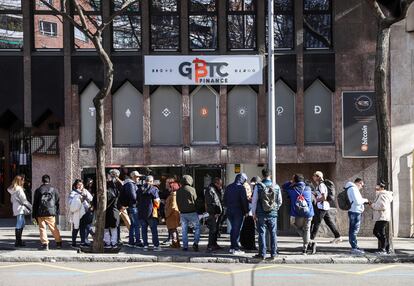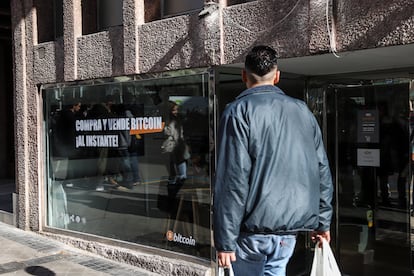The murky world of crypto ATMs takes off as prices soar: ‘Some people are paying for their rooms with this stuff’
The 40,000 machines that dispense digital assets around the world have taken center stage in the heat of the Worldcoin boom and the rising prices of tokens and cryptocurrencies


They are not something that stands out to anyone who isn’t looking for them. Embedded in a discreet corner of a shopping mall, cryptocurrency ATMs have appeared, looking more like a slot machine than a bank ATM. In one of them, in the center of Madrid, there is a strange warning in capital letters: “Important: if you have received a call from your boss telling you to come here, do not buy! You are the victim of a scam.” This disconcerting message is also not the expected welcome for potential cryptocurrency investors who, once they stand in front of the screen, are informed that the activity they are about to carry out is not regulated, among other conditions. However, next to the machine there is a long line of anxious customers, when barely an hour is left before the ATM closes.
Worldwide, there are 40,000 ATMs that work with cryptocurrencies, according to data from the analysis firm Coin ATM Radar. These ‘BTMs,’ as they are known, allow for the sale of cryptocurrencies (also the purchase, although this is a minority of transactions), and their attraction lies in the fact that they bring the complex world of cryptoassets down to street level (or to the shopping mall): many of these firms target their services to people with little knowledge of the sector and, usually, low incomes. Their big appeal is quick cash and, in some cases, anonymity.
Crypto-assets, as a form of investment, are not yet regulated. The European regulation that will bring order to their activity, MICA (short for markets in crypto-assets) will not come into force until the end of this year, and then only in a small part. “We operate among many gray lines,” notes Aitor de Linares Serrano, head of marketing for Shitcoins, a BTM operator, in Spain. “Often we don’t know we’re doing something wrong, until we do it.”
Sandra (35 years old, Madrid), has been looking for a cryptocurrency ATM for four days. She has moved, she says, from a house she squats in the Barajas neighborhood to a shopping center in the Salamanca neighborhood as a last resort. “I need money, the police came to my apartment this morning.” Sandra is far from the usual profile of the crypto bro, and her search for cash is due not to the resurgence of bitcoin, which topped $69,000 on the stock market for the first time on Tuesday, but rather she is looking to make a quick buck through Worldcoin, the new crypto project of OpenAI founder Sam Altman, which is already worth some $10 billion on the stock market and has risen 337% since 2023.
The deal seems straightforward: users sell their biometric data to the company and, in return, Worldcoin, which uses the images to advance the development of AI programs, pays with redeemable cryptocurrencies or tokens. Prices are variable, but this month the iris capture is paid at 10 tokens, plus a biweekly subscription of an uncertain amount (now, three tokens) and a bonus of 10 for each additional user referred (up to five at most). And, although users may not know what bitcoin is, the currency moves up and down like all other cryptoassets. It now trades above seven dollars, so the image transfer brings in at least about 70 euros. It has four million users globally.
The Spanish Data Protection Agency (AEPD) ordered on Wednesday the blocking of this activity (and the blocking of the data already collected). The authority has given Tools For Humanity, the technology company that developed it, 72 hours to stop the ‘Orb,’ devices that capture the image, from operating for three months. Worldcoin plunged 10% after the suspension.

Next to the storefront of a GBTC Finance establishment on Paseo de la Habana in Madrid, which includes one of its 30 BTMs in the capital, a dozen people wait to redeem their Worldcoin tokens. None of them know that bitcoin’s valuation has brushed $1.5 trillion. Nor do they care. Nor do they fit the profile of a cryptoasset aficionado: they are mostly immigrants looking for new ways to send remittances to their home country, or people looking to cash in on the latest fad. “There are people who pay their room rent with this,” they admit. Others are also unclear about the commissions they charge for using their machines, and most brokers don’t provide that information until the user is in the middle of a transaction. One woman was not even aware that she had to own cryptocurrencies in order to get money.
“Our clients are usually people who are unfamiliar with the world of cryptocurrencies. We help them,” says the CEO of GBTC Finance, Alejandro Montoya, who acknowledges that the commissions charged in the 19 branches it has in Spain tend to vary: where there is more demand, the commissions are higher.
José Ruiz (51 years old), earns €1,300 a month as a corpse embalmer and has come to this store to redeem Worldcoin cryptocurrencies for the first time. He admits that he decided to scan his iris and sell his biometric data after a friend’s recommendation. When asked about the lack of regulation on cryptoassets and the warnings issued about data protection, Jose lights a cigarette and shrugs his shoulders. “Don’t look a gift horse in the mouth,” he concludes dryly.
High commissions
The commissions charged by these ATMs are higher than those of traditional banking and, also, than those of the operating cryptocurrency platforms. In Spain, as an example, GBTC charges under 5% in commissions to buy bitcoin, and 7% if the client wishes to sell cryptocurrencies, according to a company manager. BitBase’s commissions, on the other hand, usually touch double digits: if you make a transaction between 20 and 1,000 euros, they charge a 10% commission, and if the client withdraws or sells an amount above 1,000 to 2,500 euros, 8%, they claim. The manager points out that the cheapest and most attractive method is by bank transfer, where they only charge 5%, although some banks, such as Caixabank, usually refuse.
However, if you are looking to redeem a Worldcoin token, like most customers around the BitBase ATM, the fees fly to 25%, a decision that the company made in the face of the growing popularity of the currency. Both this platform and GBTC require a bank account and an ID to be able to operate in their ATMs, something that will be mandatory with the entry into force of MICA, but which is already usually complied with by the most well-known exchanges. Not so in the case of Shitcoins, since, as it explains on its website, it works “against the financial system.”
It thus allows the withdrawal of up to 190 euros without any kind of control, in exchange for a commission much higher than that of the aforementioned financial system: up to 10% on each withdrawal. Now, Shitcoins Club, a Polish cryptocurrency firm that defines itself as ‘anarcho-capitalist’ defends that it does not distribute Worldcoin because it goes against the company’s philosophy. “What Worldcoin does is buy personal information,” says its marketing manager, Aitor de Linares Serrano.
Sign up for our weekly newsletter to get more English-language news coverage from EL PAÍS USA Edition
Tu suscripción se está usando en otro dispositivo
¿Quieres añadir otro usuario a tu suscripción?
Si continúas leyendo en este dispositivo, no se podrá leer en el otro.
FlechaTu suscripción se está usando en otro dispositivo y solo puedes acceder a EL PAÍS desde un dispositivo a la vez.
Si quieres compartir tu cuenta, cambia tu suscripción a la modalidad Premium, así podrás añadir otro usuario. Cada uno accederá con su propia cuenta de email, lo que os permitirá personalizar vuestra experiencia en EL PAÍS.
¿Tienes una suscripción de empresa? Accede aquí para contratar más cuentas.
En el caso de no saber quién está usando tu cuenta, te recomendamos cambiar tu contraseña aquí.
Si decides continuar compartiendo tu cuenta, este mensaje se mostrará en tu dispositivo y en el de la otra persona que está usando tu cuenta de forma indefinida, afectando a tu experiencia de lectura. Puedes consultar aquí los términos y condiciones de la suscripción digital.








































